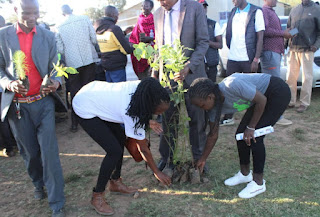TREES & URBAN AREAS.
 |
Donating trees to the pastor of AIC Church, Eor-Ekule Centre, who will later distribute them to church members for planting at their homes, after first planting some within the church compound.
|
TREES & URBAN AREAS
Trees are more than just part of nature in towns and cities, they should be treated as essential infrastructure. Just like we plan for roads, water systems, and drainage, we should also plan for green spaces where trees can thrive. Every tree planted is an investment in cleaner air, cooler streets, and healthier communities.
Recently, at Eor-Ekule Centre, we donated and planted trees with members of the community. This event wasn’t just about putting seedlings in the soil it was about building a future where our urban areas remain livable for generations to come. The joy on people’s faces, the hands of children helping fill the soil, and the conversations shared under the shade of older trees reminded us that environmental conservation is deeply personal.
Here’s why trees are so important in urban environments:
1. Absorbing Carbon Dioxide-Trees naturally pull carbon dioxide from the air, helping fight climate change. A single mature tree can absorb up to 22 kg of CO₂ each year, making them silent yet powerful climate warriors.
2. Reducing Energy Demand- By shading buildings, trees lower the need for air conditioning, cutting both costs and emissions. This means more affordable energy bills and less strain on power grids during heat waves.
3. Managing Stormwater- Their roots absorb rainwater, reducing flooding and easing the pressure on drainage systems. In areas with poor drainage, trees can be the difference between a quick shower and a damaging flood.
4. Cleaning the Air- Leaves trap dust and filter harmful pollutants such as nitrogen dioxide, sulfur dioxide, and tiny particles that can harm our lungs. Cleaner air means healthier people.
5. Cooling the Environment- Through evapotranspiration, trees release water vapor, creating a cooling effect in hot urban areas. This natural “air conditioning” helps reduce the urban heat island effect.
6. Protecting Soil- Tree roots prevent erosion and keep the ground fertile, which is especially important in places with heavy rains or construction activity.
7. Supporting Urban Wildlife- Birds, bees, butterflies, and other creatures find food and shelter in city trees, keeping local biodiversity alive.
8. Boosting Mental Health- Green spaces and tree-lined streets provide calm and beauty, reducing stress and improving mental wellbeing. Simply walking under a canopy of trees can brighten someone’s day.
How You Can Help, Even in Small Spaces
Not everyone has a big yard or public space to plant trees, but there are still ways to make a difference:
1. Potted Trees and Plants- If you live in a rental or small home, grow trees in large pots or containers on balconies or courtyards.
2. Support Community Projects- Join local tree planting drives, school greening programs, or market beautification initiatives.
3. Protect Existing Trees- Avoid damaging tree roots during construction, and report illegal tree cutting to the authorities.
4. Educate Others- Teach children and neighbors about the value of trees. Knowledge inspires action.
5. Water and Care- A newly planted tree needs attention. Water it regularly, especially during the dry season, and protect it from livestock or damage.
The work at Eor-Ekule Centre is just one step, but it sends a powerful message: tree planting is not a luxury, it’s a necessity. Whether in large parks, school compounds, road reserves, or even small home gardens, every tree matters.
When we plant a tree, we are not just adding greenery, we are shaping a future that breathes. Let’s make tree planting part of every urban plan, because a city without trees is a city without life.
For more information or to get involved, contact:
naretmuj@gmail.com
.jpg)






.jpeg)
.jpeg)
.jpeg)
.jpeg)
.jpeg)













